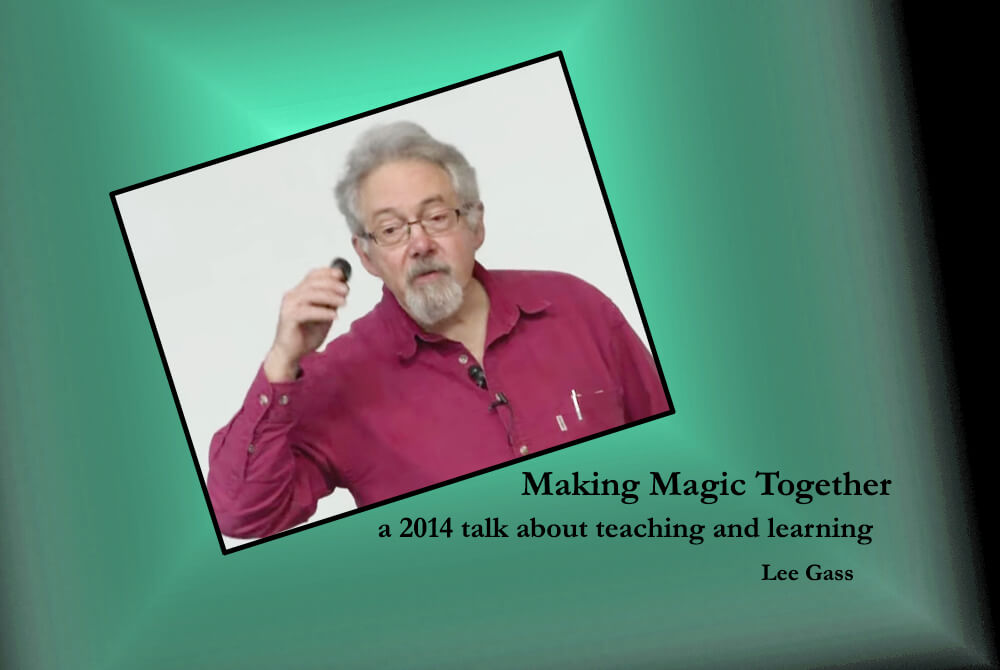In the
terrible title of a talk
I gave at McMaster University
in 2014, I talked about something I thought
worth thinking about when anyone thinks about
helping people learn, which is magic. It feels like
magic to me whenthings snap into place, something
kicks in, learning takes off, and nobody even thinks
about slowing any of it down. Learning at the
speed of light, or whatever we call it when
it really really works in a room.
Magic happens, and every
one can feel it.
About classrooms,
Brett Gilley called this a feeling.
It has everything to do with human
consciousness and nothing in particular
to do, necessarily, with education or class-
rooms. Antonio Damasio called it The
Feeling of What Happens. I think
of it as making magic
together.
In the talk,
I wanted to make it
clear that the kind of magic
I was talking about lives and thrives
on cooperation, collaboration, and
clear, honest, open, trust-
ing communication in
every direction.
The full title of the talk, as
embarrassing as it is for me to
admit it to you now, was “Stories
of Transformation in Higher Educa-
tion: Students, Faculty and Administra-
tors Creating Magic Together”. That’s
awful! Now I think of it as Making
Magic. Here’s my only excuse for
the title, not good but all that
I have, so I may as well
see if I can sell
it to you.
The day
Arshad invited me to
McMaster and long before the
trip, he said he needed a title right
away and I gave him one without
really thinking about what it
might mean for what I
say about it when
the time came.
Does it happen
that way for everyone? I
get myself in trouble doing things
like that. Fortunately, I usually discover
things worth knowing about what I talk about,
and about myself, getting back out of the messes
I create. Unfortunately, I discover many of them
while I’m actually talking! My childhood friend
Paul Phipps said about himself in a speech
in Mrs. Coon’s English class that he
talked so fast he said things he
hadn’t yet thought of.
My PhD
student Peter Cahoon
called it “speed lying” when
people who are extraordinarily
good at thinking on their feet turn
problems, as Buzz Holling said in
the video about his Environment
Prize, into opportunities.
In
relation
to creating
problems and having
to work our way out of them,
see Creativity: The Case of Michael
Ondaatje. According to him his writing
is like that. My sculpting, learning, educating,
writing, and doing science are definitely that
way, and Gerhard Herzberg seems to agree
about the science. I told a story about my
own scrambling in Stories about
Stories and A Decade
of Innovation.
Edited January 2019



Hey Lee, was looking at your recent discussion on NWSSA email and ended up on your beautiful website further down the rabbit hole than intention. Listened to the “making magic together” piece , very enjoyable and agreeable. Just jumped out of there and scrambled off to amazon to purchase the daniel kahneman book ,’thinking fast and slow” you rattled off at 27:30 in the video, and look forward to reading through. You left the video with some final pieces chopped off? Well, perhaps they weren’t as important? Seemed like they were. Thank you for being an amazing human being who continues to bring out the best in our world of presence. Sincerely, Daniel
Thanks a lot, Daniel. I appreciate your comment and remember you and your mind very well from Camp Brotherhood.